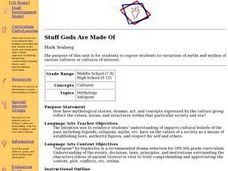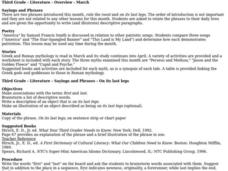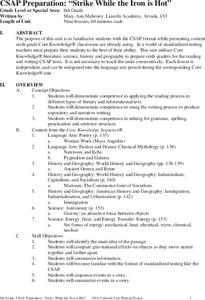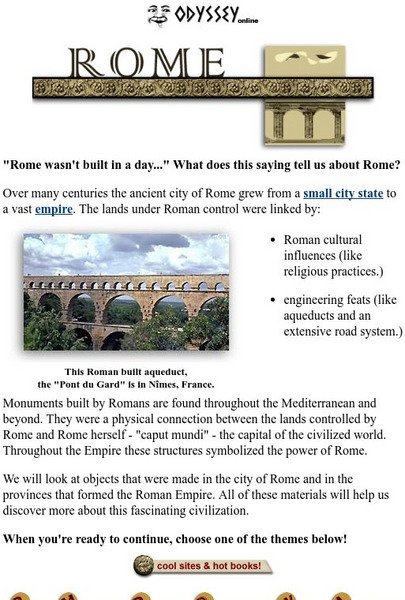Curated OER
The Use of Myths in Science
Students are told stories, myths and legend to explain their world. After telling the tales and discussion them, students are assigned to write a myth that describes a familiar situation, such as why the school garbage cans are always...
Curated OER
Mythical Mayhem
Students explore Greek and Roman mythology in this five lessons unit. Common gods, their roles in the myth and stories of the era are surveyed as students take on the personality of a mythical character.
Curated OER
Civilizations Leadership
Students view a segment of Prosperity and Decline. They discuss what attributes made the empire strong. Students discuss what caused the fall of the Roman Empire. They write an essay describing the cause of the fall of the Roman Empire....
Curated OER
Mythopoly: Where in the World Is Odysseus?
Students study Greek mythology. Among other activities, they evaluate a work of art and discuss the influence, significance, and history as it pertains to mythology. As a culminating activity they create a board game that shows their...
Curated OER
Stuff Gods Are Made Of
Students examine different myths of various cultures around the world. Using artwork, they discuss the artistic designs and develop hypothesize about their importance. They use the internet to research myths they are aware of and share...
Curated OER
Myth Connections
Ninth graders present tales and myths in the oral tradition. They discuss the African method of telling a story where each member of the group tells a part of the story. They make up a composite hero and write a story that describes...
Curated OER
Goddesses Are Personifications Too!
Students discover the use of personification as a way of expressing ideals. In this Language Arts lesson, students create an allegorical depiction of a contemporary ideal. Students write labels that clearly support the...
Curated OER
Rome Comes to Third Grade
Students explore the world of Ancient Rome in this thirteen lessons unit. the rise and fall of the Roman Empire is probed. The ideals that inspired the people's sense of purpose are developed in these lessons.
Curated OER
Mythology in the ESL Classroom
Students study myths, mythological figures, and the ancient classics. They develop a sensitivity to the beliefs, values, attitudes, and views of man's development at that time. They illustrate the powers of each god discussed and...
Time Warp Trio
See You Later, Gladiator!
Young historians take a look at the age of gladiators, and the cultural atmosphere present when they staged their epic battles. Pupils pretend to be reporters and write newspaper articles about one of the events they stage. Then,...
Curated OER
Reading Word Recognition, Fluency, and Vocabulary
Eleventh graders analyze words that derive meaning from Greek, Roman, and Norse myths. In this myth vocabulary instructional activity, 11th graders work in learning groups as visual learners, kinesthetic learners, and artistic learners...
Foreign Policy Research Institute
Intro to China
Understanding the global interconnection between people of other nations is extremely important in our ever-shrinking world. Emergent global thinkers examine the significance of Chinese culture, religion, and political power. They then...
Curated OER
Pilgrims and Puritans
With graphic organizers galore, learners will follow the changes of church and state in early colonial America. They look at the differences between the pilgrims and the puritans in terms of beliefs and life ways. Myths and...
Curated OER
Literature
Third graders study phrases, poetry and myths of Ancient Greece and Rome in these lessons.
Curated OER
What Happened?
Students read legends about volcanoes. They develop their own legend and shares them with the class. They practice their writing skills as well.
Curated OER
It's Written in the Stars!
Children create narrative accounts about their character traits, illustrate the constellation of each sign of the Zodiac, and write and illustrate their own creative myths about an original "Zodiac Sign". They use the computer as a...
Curated OER
Introduction to Greek Theatre
Young scholars create a tableau for a Greek myth. In this introduction to Greek theatre instructional activity, students discuss the history of Greek theatre and tableau and complete a handout. Young scholars work in groups...
Curated OER
The Wilderness Concept: Our National Parks, History and Issues
Students examine the history of the National parks. In groups, they discuss the concepts of conservation and preservation. They discuss the use of natural resources and how some are renewable and non-renewable. To end the lesson, they...
Curated OER
Reading Comprehension/Valentine's Day
In this reading comprehension activity, students learn facts about Valentine's Day by reading a one page story. Students then answer 6 questions.
Curated OER
"Building a Word Wall" Roots - The Foundation of Language
Students probe the impact of Greek and Latin on the English language in this ten lesson unit. Root words are analyzed for their origins and displayed on a word wall. Inventions are created using the words and placed in a class museum.
Curated OER
Doctor Faustus - Essay Questions
In this literature worksheet, learners respond to 16 short answer and essay questions about Marlowe's Doctor Faustus. Students may also link to an online interactive quiz on the novel at the bottom of the page.
Curated OER
CSAP Preparation: "Strike While the Iron is Hot"
Students survey several concepts in literature, science, history, and geography as a preparation for the CSAP standardized testing experience. This nine lesson unit provides exposure to the format and content of the test.
Emory University
Odyssey Online: Ancient Rome
Terrific site about ancient Rome. Site breaks down information into sections about people, mythology, daily life, death and burial, writing, and archaeology. There are also games to play as you go along.
National Gallery of Art
National Gallery of Art: Diana and Endymion
Students will be introduced to the Greco-Roman myth of Diana and Endymion by critically analyzing a painting by Fragonard. They will then write and illustrate their own myth to describe a natural phenomenon or social custom.























